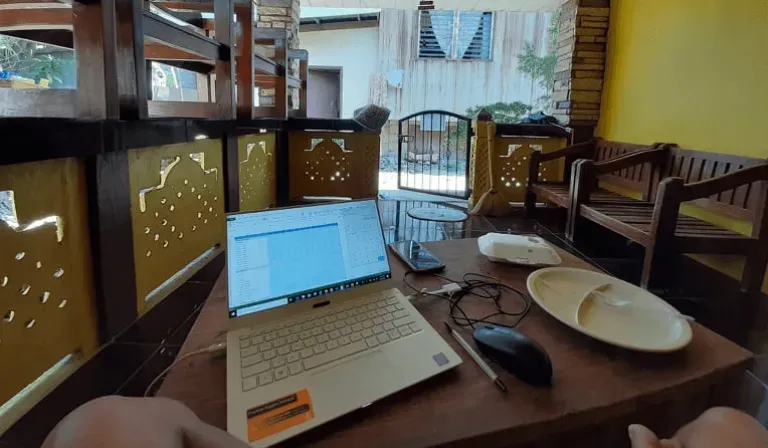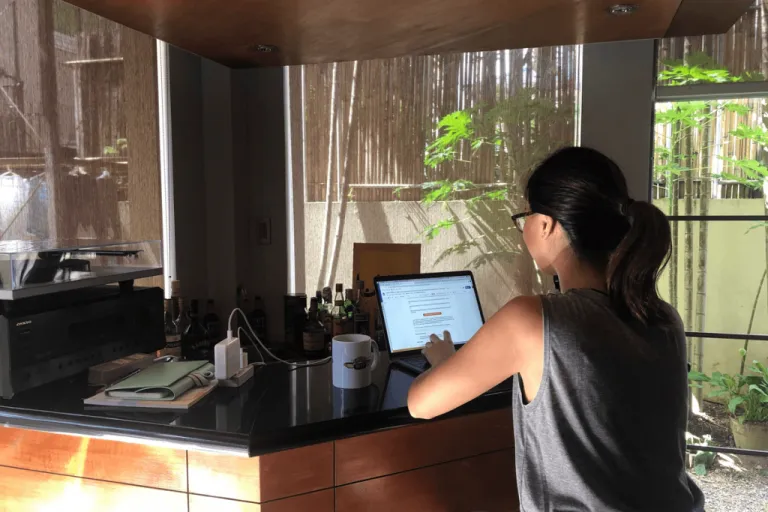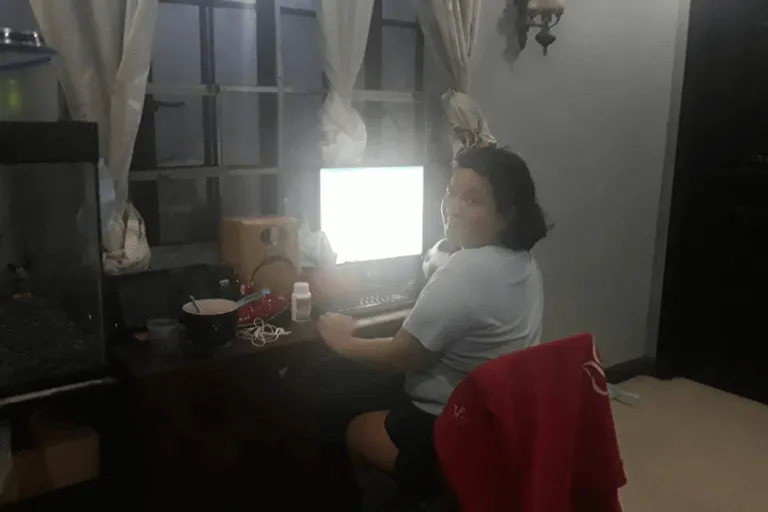The only plastic we need for travel.
Work from Home in the Philippines? It’s Tough, But We’re Coping

“What I like about working from home is we don’t need to travel to go to the office, which saves time, money, and effort. We can even wake up 30 mins before logging in to work, unlike going to the office where we must wake up at least two hours before to prepare,” shared Derrick Pua, a quality assurance analyst who was one of the many Filipinos mandated to work from home in the Philippines when a pandemic struck the globe.
Although he’s only worked for a few months outside of his typical office in Taguig, Derrick has adapted to his new setup by having a shared home office and enjoying the benefits of work-from-home convenience. On top of employees like Derrick, there exists a well-established community of home-based workers in the Philippines who share his sentiment towards a more flexible way of working.
The known benefits of work from home in the Philippines
Like Derrick, electronics engineer Severo Balucas was ordered to work from home when the lockdown was imposed in Metro Manila, where his telecommunications company is based. For the last few months, he’s been staying in his hometown in Isabela. There, he manages to perform his daily duties from the comforts of his home.
“I love being able to work from home, especially working with your meals ready every day, since my mother cooks for me,” Severo shared as he sat down in his improvised home office just outside their main house. “It’s convenient not to travel anymore, so I have more time to sleep. The aura of home in our province is therapeutic compared to crowded cities as well.”

Charmaine Acha, TripZilla Philippines’ country manager also said that working from home has saved her a lot of time, which she uses for other personal things. “As we all know, commuting is no fun in the Philippines,” she said. “Instead of spending agonising hours in traffic, not to mention the health risks, I get to use the extra time for sleep and self-care activities like reading or binge-watching K-drama.”
Recently considering work from home in the Philippines, Mary Vil-Chet, a mother of four in Leyte, believes the setup is practical for her family, especially during the pandemic. “The quarantine months made me realise that the best option to keep one busy and at the same time augment finances is to work from home,” the former site engineer said. “With the limited movement from border to border, it comes very handy to all.”
For Gaby Salud, one of the editors at TripZilla, working from home presents flexibility. “I can work pretty much anywhere, so long as my computer is fully charged and the Internet connection is reliable. I’m free to stretch, grab a drink or a snack, and enjoy the company of my loved ones while working,” she shared.
Aside from convenience and flexibility, one could go on about other work-from-home benefits like saving money from commuting, having more time with loved ones, and in today’s case, avoiding exposure to a lethal virus. But people have talked about these things countless times, often to the point of over-romanticising the situation and misconstruing the reality surrounding it. Below, fellow home-based workers discuss more of them based on their experience.
Also read: 10 Tips for Remote Workers to Ensure Work-Life Balance
The reality versus the myths of work from home in the Philippines, as told by Filipinos
Myth 1: Connectivity isn’t an issue
It’s easy to assume that anyone who works from home enjoys or is adapting well to its basic requirements, Internet connectivity included. This isn’t always the case. And unsurprisingly, the majority of those I’ve talked to unanimously brought up connection as one of their biggest challenges when working from home.
“Fibr wasn’t readily available when I started, so I had to make do with the fastest DSL speed at that time, which was 10mbps,” EmJay Bituin, one of the members of a Facebook community for work-from-home Filipinos, explained. “To tell you frankly, the service sucked, and I lost many clients just because of my ISP’s inadequacy.”

He added that as years went by, very little improvement has been made on this aspect. “The sad reality is when it comes to Internet connectivity, the Philippines lags behind other Asian countries. To keep my clients happy, I upgraded to a business plan which is yet another drain on my income.”
Dave Garcia, the founder of Work from Home or Anywhere – Philippines, another online community for home-based workers, opened up about the same issue. “There are times the Internet connection is not so stable,” he said. “If there is one thing that I want to improve about work from home in the Philippines, that is the Internet speed here in our country so that we can compete with other countries in terms of reliability.”
Myth 2: Everyone has a private home office
In the Philippines, not everyone gets to have a home office where they can work all day undisturbed. Taking into consideration the family-orientedness of our culture (most members of the family live together for extended periods of time) and the costs of having one’s own home, finding or building a home office isn’t as easy as it looks. At best, one gets to have a shared workstation like Derrick. Others make do with any available space within their home.
EmJay said that some of his clients require employees to have an environment conducive for working. This is basically a place that’s free from distractions. But living in the province, this proves to be difficult. “Unfortunately, I live in the boondocks and I have roosters for neighbours. You won’t believe how many times customers and clients ask me if I live on a farm,” he told TripZilla. To remedy this, EmJay invested in a dedicated and sound-proof workspace for himself.

Alex Montojo, an English as a Second Language (ESL) teacher for three years, regularly deals with calls with students. This makes having a private space crucial in her line of work. “I live in a community where the streets are too narrow. I also live in a duplex house that’s not soundproof, so noise is really a problem,” she said. She also worries about times when she has to work late and her family is already resting. “I tried covering my windows with used boxes, but it’s too hot and suffocating. I’m just using thick blankets or towels now.” Alex giggled as she recalled the things she’d do to cope.
Privacy has also been a concern for Severo, who stays with his parents in Isabela for the time being. “When I have meetings and my family isn’t aware, I have to move somewhere else or mute myself,” he said.
For Gaby, it’s the idea of being at home that gives out a misconception of being free all the time. That said, people would reach out to her anytime. “Some people think they can reach me no matter the time of day because I’m ‘always at work’,” she said. She then added that an application or programme that blocks out work-related emails outside work hours would be helpful.
Myth 3: Equipment is never a problem
Not having your own space to work in poses enough of a challenge for a number of home-based workers. But it’s even worse for those who still lack the most fundamental work-from-home essentials, including a personal computer.

“I was working for a call centre before, but it burned me out. So I made up my mind to save up and buy my own PC,” EmJay shared. “I bought the latest one at that time and spent around ₱30,000 on just the computer. It took me a year to save money. And it took me almost the same time to earn the money back from working at home.”
Severo also said that lacking a quality working chair has been a physical struggle for him. By the end of a workday, his back would often hurt. A home-based worker for about a decade, Charmaine said that aside from having a newer laptop and smartphone that would serve her well in the coming years, she also needs to invest in protective eyewear. “Protecting our eyes is a must in this kind of job where there’s long exposure to computer radiation,” she asserted.
Myth 4: Discipline is easy to observe
It’s not new when others associate working from home to having the liberty to lay around whenever we want. But often without physical guidance or surveillance, this can lead to an alarming level of procrastination among work-from-home Filipinos.

According to his observations from his online community, Dave said that by staying at home, one tends to take everything for granted as well. “When you need to hone your skills, it’s sometimes hard to get a motivation to learn something new,” he shared. “In a corporate setup, training is conducted. You will have a more sense of accountability to learn since you’re there personally. In a home-based setup, there are times that you can’t focus because of the distractions around you.”
Hand in hand with personal discipline is struggling to balance house chores with work. “I also don’t like it when we have sudden night meetings since we are just staying at home. We need to do house chores as well,” Derrick replied when asked about what he struggles with the most in his current setup.
Myth 5: Social interaction is not important
Derrick further said that working at the office still has the advantage of being able to work physically with colleagues. This is something he looks forward to the most after spending the last four months under home quarantine.

Another work-from-home online community member, Angela Magpayo, agreed. “I don’t get to interact with workmates as much as I want to,” she said. She went on by saying that employers should also take the time to nurture an interactive work-from-home arrangement. Doing so would foster better engagement among company members. “Employers still need to approach this as if they are all working in the same space. Make work-life balance actually work for these employees.”
Myth 6: There’s a (well-compensating) job for everyone
Before getting into monetary compensation and benefits, it’s worth mentioning that work-from-home is not for everyone. And I mean this literally because not all professions are suited for home-based arrangement. Some workers turn to work-from-home as their freelance job, on top of a day job. Others end up doing it full-time.

As for compensation, home-based freelance worker James Labadisos mentioned that working from home on a freelance basis often comes with a lot of unpredictability. “I want the government and everyone who considers this industry an ‘easy-money-sitting job’ to know that this is an unpredictable paying job, too,” he shared. He currently juggles three jobs including administrative assistance and social media management.
Dave further emphasised that for typical home-based workers, meaning those that have been working even before the pandemic, benefits are often an issue. “People who work from home are mostly freelancers. That means they don’t have benefits like SSS, Pag-IBIG, and so on,” he shared.
Also read: How to Work From Home Productively, Without Losing Your Sanity
Making the Philippines a more work-from-home friendly country
The work-from-home industry has a long way to go in the Philippines. And while the current pandemic has opened many’s eyes to its many benefits, gearing up companies and workers for this setup will take time. To make the Philippines a more work-from-home friendly country, the need for better connectivity, work-from-home essentials, and clear policies among companies calls for painstaking evaluation.
In addition, employers would also have to invest in their employees through just compensation. “It’s not a reason to charge someone a smaller rate just because they are working from home. We are still eating. We still need to buy infrastructure and tools, as well as pay utilities. So I hope employers do not haggle too much,” Angela further explained.

As Mary earlier also pointed out, preparing to work from home is demanding enough as she has to consider a multitude of things to make it work for her. In the past weeks, she’s been actively reaching out to companies in the hope of landing a job as a quantity surveyor or project coordinator on the technical side.
“It is challenging in the sense that it is not as easy as just not going to the workplace,” Mary clarified. “There are physical things that you need to set up in order to connect with others; it also means you need to invest in suitable equipment. It’s challenging because you need a quiet space in your home, and because you need to update skills that would fit to what is needed for the job.”
The quotes above have been edited for grammar, clarity, and flow.
Published at
About Author
Joser Ferreras
Subscribe our Newsletter
Get our weekly tips and travel news!
Recommended Articles
14 Best Credit Cards for Travel in the Philippines 21AM Digital Museum by CCP Launches on 25 Feb 2022 View the inaugural exhibition for free!
Why You Have to Try Listening to 8D Music on YouTube It’s a mind-blowing experience.
12 #Adulting Apps Every Pinoy Millennial Should Have Confession: As I continue to progress further into my 20s, I undeniably find myself morphing into the tita I never thought I would be. And by this, I mean I’ve learned to (obsessively) monitor my expenses through various #adulting apps, realised we really do have food at home (because eating out has made a giant […]
10 Aesthetic Electric Fans That Scream #HomeGoals We scoured the Internet for the prettiest ones.
Latest Articles
Dingalan Travel Guide: Nature Spots to Discover Now Underrated coastal gem in Aurora
What to Eat in Bicol: Iconic Dishes and Treats, and Unique Pasalubong You’ll Love Spice up your foodie adventure with iconic Bicol dishes and must-try pasalubong!
Top Travel Trends in the Philippines for 2025 New spots, tips, and trends
New UK Adventure Park to Visit in Devon and Cornwall Fun countryside escape near London
Ultimate Camarines Norte Travel Guide: Waterfalls, Beaches, and More From surfing to secret waterfalls, Camarines Norte is your next escape!

